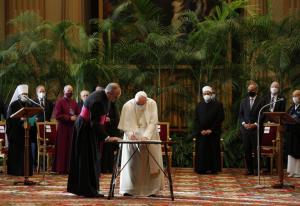
I’ve been posting about the response of the bishops of Chile to the oppression of the Chilean people under the Pinochet regime. This post is about another emergency and another group of bishops. Now it’s in the U.S. state of Minnesota. Here the bishop’s response to the way we oppress the natural world comes in a document advocating an integral ecology. “Minnesota, Our Common Home” it’s theologically profound, but, Like the initial actions of the Chilean bishops, it’s also timid, weak, and limited to generalities.
The Catholic Church in Chile eventually had the courage to act forcefully, naming and condemning specific individuals and abuses. Future posts will show the role the bishops and the Church played in Pinochet’s downfall in 1990 after 17 years in power. We don’t have that much time to solve the ecology crisis. The Catholic Church, worldwide and in the U.S., knows that and is responding. As a Minnesota Catholic, I look to my bishops for more forceful action.
Excellent background for environmental concern, but it’s very late
Integral ecology is a theme in Pope Francis’ second encyclical, Laudato Si. The bishops refer to his publication throughout their statement. I want to commend them for taking on this issue. I received this document in February as a participant in the lobbying action “Catholics at the Capitol.” Calling for an integral ecology, the document looks at the big picture of humankind’s relationship to nature. It explains well why Christians especially should be concerned for the health of the planet—God’s gift and our common home.
Unfortunately, the devil, as they say, is in the details; and it’s there that “Minnesota, Our Common Home” falls short. A few quotes will show both the lofty tone of the document and what it leaves out.
INTRODUCTION
- Cooperation, not domination, is at the heart of our call ‘to till and to keep’ the garden of creation…. Ecological concern is … no longer optional or a secondary aspect of our faith.
Part 1, A CRISIS OF NATURE
- We … tend to experience a profound alienation from our own ‘embodiedness.’ … We lost a sense of our own interconnectedness.
- Technology is not morally neutral…. The … logic of technology is seductive and, if unchecked, quickly starts to dominate everything.
- We need a complete transformation—a conversion to an ecological vision of the human person, creation, and Creator.
- A technological worldview is blind to the intrinsic value of things, seeing only what is advantageous.
- The ecological crisis is certainly urgent, but it is also a symptom of something deeper: the need to recover a strong sense of the nature of things and to see once more that creation is not a blank canvas but God’s work of art. We are nature’s stewards, not its masters.
Part 2, ECOLOGICAL CONVERSION
- We are woven into the fabric of creation…. There is no such thing as a solitary human person.
- The task of stewardship is not a burden arbitrarily imposed on us, but a response to the love and mercy that God has poured into our lives.
- We must learn to see the created world as God sees it, and to treat created things with the reverence due to God’s design.
Part 3, INTEGRAL ECOLOGY
- The natural ecology and the human ecology comprise one unified reality. … Each is dependent on the other.
In this last part the bishops get a little more specific. They turn to three areas of concern to Minnesotans and integral ecology. They speak of the need to “cherish and protect” natural resources. A section on agriculture lauds farmers’ markets and small-scale, sustainable farming. It opposes “practices that harm the environment, farming communities, and consumers.” The bishops are most specific in addressing “an ecological view of the human person.” Integral ecology, they assert, includes accepting and caring for our bodies as masculine and feminine. They decry contraception as unnatural and gender theory as ideological colonization. They name assisted suicide as one of the chief ways our distorted dominion over nature expresses itself.
As a philosophical and theological foundation for the proper way to relate to the earth, this document works. Unfortunately, that was a task for about four or five decades ago. You don’t pause to wonder “Why am I doing this?” in the middle of a hard-fought campaign. That is where we are in the worldwide campaign to save the earth for future generations. In fact, we are at the crucial point, and we are losing.
A missed opportunity
This Minnesota bishops’ document on integral ecology is a missed opportunity in a number of ways. It fails to address major environmental issues and the skepticism about established science that still exists, including in Minnesota. While Pope Francis calls care for our common home a pro-life issue, the bishops never make that connection. That would have appealed to many Minnesota Catholics. Francis is clear that political action is an important part, though not all, of a Christian response to environmental crisis. Politics doesn’t appear in “Common Home.”
I read the document without noticing anything like a sense of urgency in it. A final section proposes that
our ecology, derived first and foremost from love for the Creator, need never be worried or anxious—whether over greenhouse gases, apocalyptic weather events, or even our own extinction—but always filled with hope…. No crisis that we face is greater than the sovereign Providence of God, who draws everything in love to Himself.
Obviously the bishops didn’t mean to say we can relax our ecological vigilance, but compare this statement with Laudato Si:
Doomsday predictions can no longer be met with irony or disdain. We may well be leaving to coming generations debris, desolation and filth. The pace of consumption, waste and environmental change has so stretched the planet’s capacity that our contemporary lifestyle, unsustainable as it is, can only precipitate catastrophes, such as those which even now periodically occur in different areas of the world. The effects of the present imbalance can only be reduced by our decisive action, here and now. (#161)
A step back
By comparison with Laudato Si, this document is a step back when it could have been a step ahead. Climate change, which takes up five pages in Laudato Si, here gets only a footnote. The bishops could have said, to a state where doubters are still a vocal minority, human-caused climate change is real.
Species extinction, happening at possibly 1000 times the natural rate, gets no mention at all. “Before a thing is useful, a thing is, and its existence is good,” the bishops state. We hear nothing about the value of keeping “a thing” from going extinct or the danger such rapid loss of biodiversity poses to ecological systems.
The bishops treat agriculture, an important part of Minnesota life, without mentioning the very live issues of soil erosion and water pollution from agricultural runoff. Live responsibly is about the extent of the solutions the bishops offer on any issue.
What role for the Church?
Thinking back to those bishops in Chile dealing with an oppressive state—the question they wrestled with arises here too. What is the Church’s proper role in the secular world? Shouldn’t the bishops be shepherding souls instead of dabbling in politics, and economics? The answer, the Chilean bishops learned, is that the Church’s business is not souls but people. When the people suffered, including in their bodies, it was the Church in Chile that suffered; and the Church had the duty to respond.
We do not exist as souls who happen to have bodies. So too we do not exist as individuals who happen to have a world of other people and things. As the bishops state, everything is interconnected. When the environment suffers, the Church suffers. Whatever benefits or harms come to the earth the coming Kingdom of God notices. Pope Saint John Paul II knew that nothing in politics or economics is beyond the Church’s area of concern. This is from “The Ecological Crisis: A Common Responsibility, January 1, 1990:
The right to a safe environment is ever more insistently presented today as a right that must be included in an updated Charter of Human Rights.
It must also be said that the proper ecological balance will not be found without directly addressing the structural forms of poverty that exist throughout the world. (Sections 9 and 11)
“Minnesota, Our Common Home,” a collaborative effort of many parties, is a collaboration with God’s Kingdom and our earthly home. It will surely help some Minnesotans. But what it offers is too little; and it’s really very late.
Image credit: Minnesota Catholic Conference












